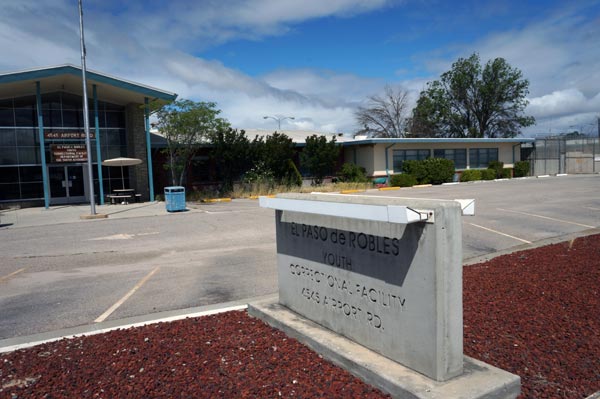City backs away from deal for boy’s school property
–The city of Paso Robles has decided to back away from a deal with the state to purchase the El Paso de Robles Youth Correctional Facility after months of negotiations. City leaders had hoped the property, now closed for 10 years, could be used for education, sports, public works, a homeless center, private development and more.
The state was asking the city to pay $4.75 million, but the sticking point was the state wanted to restrict any private development the city may want to do on the site.
At this point, the property is expected to be sold at auction to the highest bidder. The city is looking for developers who wish to partner with the city and purchase the property on the open market. At that point, no restrictions would apply, and city leaders say they might get the property at a better price.
Paso Robles City Manager Tom Frutchey gives his perspective:
Disposition of the Boys’ School Property on Airport Road
The 140+-acre Boys’ School closed in 2008. Through the end of 2017, the property sat vacant, in what the state calls a “warm shutdown,” with three maintenance personnel there full time, costing California taxpayers approximately $750,000 per year. This year, the state reduced staffing to one person. With a lack of adequate maintenance, the buildings and other improvements will continue to deteriorate; decreasing the re-use value of the entire site, over time.
The City determined that, given the many usable structures on the site, its proximity to the airport, the downsides/risks of allowing the site to remain vacant and deteriorate further, and the economic opportunities the site represented, it was important for the City to take the necessary actions to see the site converted from blight to a productive parcel. As a result, in 2016, the City took several actions, and received the assistance of our state elected officials, leading the State to start their process to surplus the property.

Paso Robles City Manager Tom Frutchey.
The State’s first step in that process is to get the responsible state department to indicate it has no future need for the site. Then the Department of General Services (DGS) takes over, and offers the site to other state agencies. If no other state agency indicates they want the site, then the State offers it to local jurisdictions (regional bodies, the county, and the city in which the parcel is located). In late 2017, DGS conducted that process and the City was the only interested party. Thus, DGS offered to declare the City to be the “preferred local jurisdiction” and start working with us to purchase the site.
Even though the City did not know if it wanted to purchase the parcel, or see it go for sale on the open market, the City opted to explore the preferred local jurisdiction option. We aren’t developers, but the site has opportunities and complex challenges—including land use entitlement, water, etc.—that warrant extensive involvement by the City. In addition, by working with the state through that process, we stood a better chance of ensuring everything that needed to be known was uncovered and put in the public record.
The City established a series of principles to govern the process, in case the City did choose to acquire the property from the state and stimulate value-generating re-use. One of the underlying principles was that, if the City did acquire the property, the income generated by the lease and / or sale of the property would be required to exceed the City’s acquisition and maintenance costs, thus ensuring no net cost to the City’s General Fund. In essence, the City would manage the property similar to our three enterprises (the water utility, sewer utility, and Airport).
The City undertook a number of steps in our analysis, which were conducted in parallel with our discussions with the state on the terms and conditions of acquisition. Steps we completed included, among others:
• A review and update of the hazardous materials assessments (including lead paint and asbestos) for the structures on the site;
• A review of the groundwater and water well analyses;
• Analysis of the requirements of the County’s airport land use master plan (which controls acceptable uses in the zones surrounding the Airport);
• A full assessment of the entire water, wastewater, and other utility infrastructure on the site; and
• Locating and discussing the opportunities and challenges with prospective tenants.
Once all these steps were completed, we were finally able to determine if, in fact, it would be desirable for the City to proceed with acquisition.
A number of constraints and restrictions became clear only after extensive discussions with the State, For example, the state imposes several conditions on any preferred local jurisdiction that purchases a surplussed site, including:
• The sales price is determined by the state’s as-is appraisal; they do not negotiate. The State’s outside appraisal of the site determined a sales price of $4.8 million.
• The site may not be resold, and can only be leased, in this case for a period of 25 years.
• Tenants can be only those servicing public purposes, such as a governmental agency, a not-for-profit, etc. for the entire leasing period (i.e., 25 years).
Under these restrictions, possible tenants could include, among others:
• A residential mental health facility;
• County government offices;
• A technical or charter school;
• Affordable housing;
• City maintenance yard.
After completing its analysis, the City decided the best course of action was to not purchase the site under the preferred local jurisdiction program, and to notify DGS so it could proceed to the next phase in the surplusing process, which is for the state to offer the site for sale on the open market. The City took this step in late November.
When selling the site on the open market, the state will not subdivide or otherwise alter the site; it is sold as is to the highest responsible bidder. In addition, the restrictions that would have applied to us under the preferred local jurisdiction program do not apply when the site is sold on the open market.
DGS has indicated that they will market the site for approximately six months and then call for bids. This should occur in July, 2019. The City still has the option of bidding on the site, either on its own or as part of a partnership, and will oversee the entitlement process for the successful bidder.
Comments
Scott Brennan is the publisher of this newspaper and founder of Access Publishing. Follow him on Twitter, LinkedIn, or follow his blog.






















